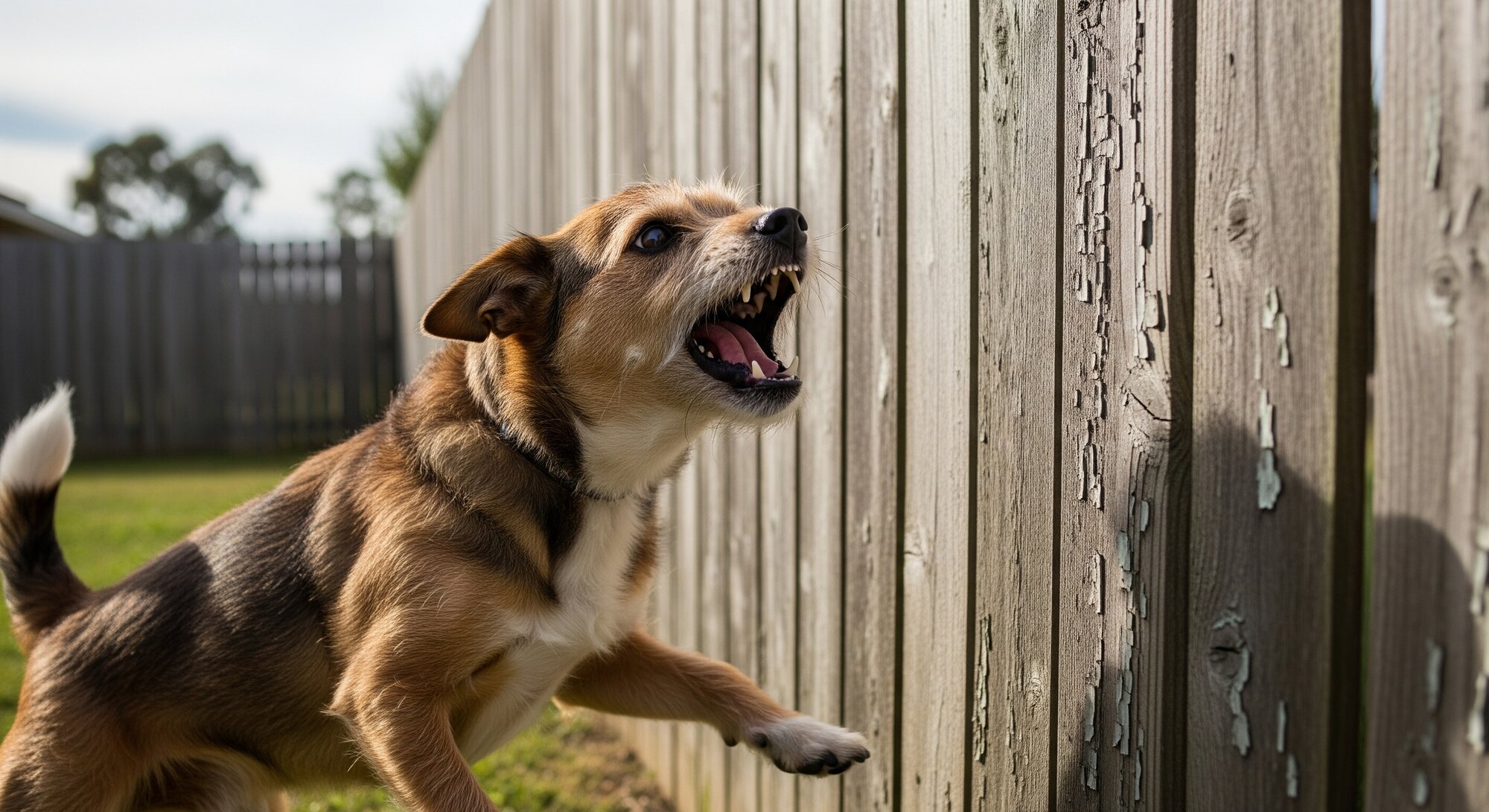Last Updated: 23/07/2025
How to Stop Your Dog Barking at the Fence
Struggling with a dog that barks at the fence? This guide explores why dogs engage in this territorial behavior. Discover effective, humane solutions including positive reinforcement training, environmental management, exercise tips, and how to address underlying anxiety to restore peace and quiet.
Author: Dr Nicole du Plessis BVSc (Hons)
Reading Time: 5 minutes - short read
Dogs bark for a variety of reasons, it is a normal and important expression of canine behaviour. However, excessive barking can drive owners, well, barking mad!
Barking dogs is a common behavioural complaint from frustrated owners, not to mention a common cause of tension between neighbours.
So, how can you stop your dog barking at the fence? There will always be the unavoidable passers-by, neighbours walking their dogs and postal delivery services. To tackle this behavioural complaint, it is important to understand why your dog is barking.
Reasons dogs bark

Dogs bark as a form of communication, with their family and with other dogs in the area. Barking can be seen as a nuisance, but it is not something that should be stopped altogether. When your dog is barking, it can help to try and understand what your dog is trying to communicate to you.
It could be:
- Basic needs, like hunger, thirst, shelter
- Territorial barking
- Frustration
- Fear
- Separation anxiety
- Boredom
- Pain
- Attention seeking
- Excitement or during play
However, excessive barking is often due to an underlying behavioural or medical problem. It is important to address the cause to be able to correct the problem.
Want to know more? Check out our article on How to Stop Your Dog from Barking.
Why do dogs bark at the fence?

Dogs are naturally protective of their home and family. Your dog barking at the fence is their way to ward off perceived threats. This can also serve as an alert woof, to let the family know there is a possible threat. Territorial barking can be particularly difficult to manage in urban areas, where there are regular pedestrians, dog-walkers, cyclists, wildlife and delivery services. There is so much to woof at!
Your dog may want to reach an object, person or pet on the other side of the fence, known as barrier frustration. Barrier frustration can manifest in other behaviours such fence running and pacing.
Ways to reduce fence barking

Recall training
Developing strong recall obedience will help owners manage dogs who bark at the fence. In the beginning, your dog will more than likely be focused on the object, pet or person rather than listening to your commands. Repeated training sessions when your dog is calm and focused will yield better results. This is all well and good when you're home but when you're out, there are additional ways to help your dog's barking.
Exercise
Exercise, exercise, exercise! It's time to get your walking shoes on and take your pooch for a walk. Most dogs should have 20-30 minutes of exercise per day. The park is another great way to exercise your dog, with lots of different sights, sounds and smells. If your dog is friendly and social, take them to the dog park! This is a great form of social enrichment for your dog.
Want to know more? Check out our article on How Much Exercise Does Your Dog Need?
Visual barriers
Installing an opaque barrier so your pooch cannot see through the fence is a practical solution to fence barking. This will reduce the visual stimuli that can trigger such barking. Your dog will still be able to hear objects, people and pets on the other side of the fence, which is why exercise, mental stimulation and training is still important when tackling this issue.
Identify behavioural issues
Barking can have more than one trigger and working with a behavioural trainer will help identify all contributors to excessive barking at the fence. Consulting your veterinarian will also ensure any underlying issues are addressed, such as anxiety or pain.
Ongoing monitoring
If you need to monitor your dogs barking while you are away, remote surveillance can be helpful to assess behaviour while you are out. Speaking with neighbours about barking and letting them know you are working with a trainer and veterinarian, can also help relieve any tension.
Address anxiety
Anxiety aids are beneficial for excessively barking dogs. Dog appeasing pheromone collars are another practical way to help calm dogs while outside. Calming supplements such as Zylkene can also be beneficial for mildly anxious dogs. In select cases, medication can be used in conjunction with training.
How to train your dog to stop barking at the fence

To address fence barking, strong recall obedience is needed. This means its back to basics! Recall is where your dog will return to your side after a command such as "come" or "here." Training these commands is most effective when your dog is calm, and it is important to make it fun for your pooch! Working with your dog in short, daily sessions is recommended to solidify these skills.
Each dog will start at a different level of obedience. If starting from scratch, a long leash is recommended to bring your dog back to your side for a reward. Once your dog is coming back when called, you can try off-leash in a secured area. Be patient with your dog, at the start of their training they are still likely to bark at the fence. The object, person or pet on the other side of the fence is often more exciting or stimulating than coming back when called. This is why using high value treats is an important training tool. The reward must be more appealing than barking at the fence. If your dog seems fixated or obsessed with what is on the other side of the fence, anxiety may play a role in your pet's behaviour. This will require the help of your veterinarian and a behavioural trainer.
A word on barking collars - the recommended way to correct behavioural problems is through positive reinforcement. This involves rewarding the correct behaviour with something your dog likes, so your dog repeats this behaviour. Barking collars are a form of negative reinforcement, introducing something your dog dislikes to try and discourage unwanted behaviour and therefore make them less likely to repeat this behaviour. Barking collars tend to increase stress levels in dogs, which can further exacerbate stress and anxiety related behavioural issues. Electric shock collars should not be used under any circumstance, and are banned in certain states.
For more information on positive-reinforcement training, check out our article on Clicker Training for Dogs.
Vet picks for training aids
In conclusion, tackling fence barking requires a multi-faceted approach that goes beyond simply trying to silence your dog. The most effective strategy involves understanding the root cause of the barking—whether it's territorial instinct, boredom, or anxiety—and addressing it with patience and consistency.
By combining practical management techniques, such as installing visual barriers, with a commitment to positive reinforcement training to strengthen recall, you can teach your dog more appropriate behaviours.
Ensuring your dog receives ample daily exercise and mental stimulation is crucial to reducing frustration and excess energy. For persistent cases, don't hesitate to consult a veterinarian or a professional trainer to rule out underlying issues like anxiety and to develop a tailored behavioural plan. Ultimately, a calm and quiet yard is achieved not through punishment, but through understanding, training, and meeting your dog's needs.
Further Reading
Want to read more? Check out our other articles:
History
Our experts continually monitor the health and wellness space and we update our articles when new information becomes available.
Fri 28 Oct 2022
Written by Dr Nicole du Plessis BVSc (Hons)Dr Nicole du Plessis BVSc (Hons)
Author, BVSc (Hons)
Dr. Nicole du Plessis is one of Pet Circle's qualified veterinarians and passionate pet care enthusiasts. Dr. Nicole graduated from the University of Queensland in 2016 with a Bachelor of Veterinary Science and worked for a number of years in small animal clinics across South East Queensland before joining the Pet Circle team. Over the years, Nicole has developed special interests in preventative medicine, infectious diseases, small animal medicine and ultrasound.

